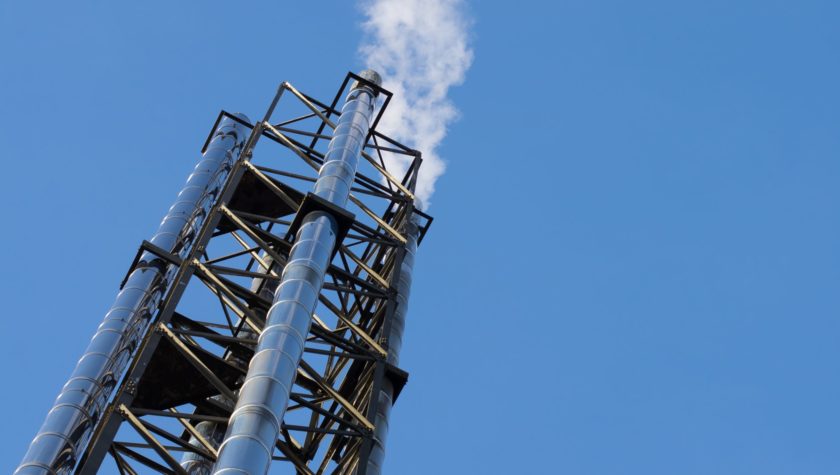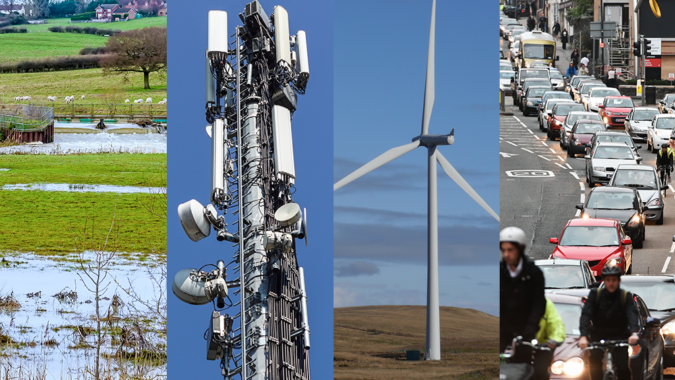We recently welcomed the Government’s new action plan on Carbon Capture and Storage, which could bring reductions in emissions from large industrial processes as part of wider efforts to tackle climate change. Our National Infrastructure Assessment – the first of its kind for the UK – examined this emerging technology, and considered where it could have the most impact both in the relatively short term, and long into the future.
Carbon Capture and Storage (CCS) technology – where waste carbon dioxide is captured, transported and stored such that it does not enter the atmosphere – has a range of potential applications which could contribute to the energy mix in a low carbon energy system:
- In electricity generation, CCS could enable the continued use of fossil fuels, effectively converting traditional fossil fuel power generating plants into a form of low carbon generation;
- In low carbon heating, CCS could be used in the production of hydrogen. Converting the gas grid from natural gas to hydrogen is one of the two major options for delivering low carbon heat at scale. The most likely method for producing hydrogen at scale is Steam Methane Reformation, which would require CCS to be a low carbon process; and
- In industrial processes, CCS can help lower carbon emissions directly from industrial processes that we are likely to continue to rely on, such as the production of steel, cement, and fertiliser.
CCS also has the potential to contribute negative carbon emissions. Through combining CCS with biomass, where bioenergy crops extract carbon dioxide from the atmosphere as they grow, CCS could prevent the carbon re-entering the atmosphere when the biomass is used to produce useable energy.
For the National Infrastructure Assessment, the Commission assessed the case for CCS within the first two potential uses, low carbon electricity and heating, as we looked to address the major infrastructure challenges in delivering the country’s energy requirements and meeting the carbon targets at lowest cost.
We considered the case for CCS in electricity generation as part of the analysis we commissioned on the whole systems costs of energy, which covered the range of levels of renewable generation and the two low carbon heating scenarios (conversion of the gas grid to hydrogen or electrification of heat through heat pumps). The modelling, conducted by Aurora Energy Research, assumed cost improvements over time from CCS and, in order to capture the potential for the use of CCS in other costs to lower transport and storage costs, we carried out sensitivities where these costs were also significantly reduced.
The analysis found that CCS was rarely a cost-effective option for reducing emissions in the power sector. Where the level of renewables generation is low, CCS competes primarily with nuclear, however the lower levelized costs of nuclear suggests it would out-compete CCS. Where the level of renewables generation is high, power prices are not high enough for CCS to be economic, owing to very low marginal costs. Where CCS did come forward in the analysis, it was only in limited quantities and only from the late 2040s. Under the sensitivity with optimistic cost assumptions, CCS did begin to compete slightly earlier, from the mid-2040s. However, given the carbon emissions targets as we approach 2050 are very tight, the ultimate role for fossil fuels and therefore CCS in the power sector is limited, and the impact on overall system costs from cheap CCS is negligible. For these reasons, we recommended that it did not make sense for electricity bill payers to subsidise CCS.
In low carbon heating, the story is very different. The primary decision which needs to be made as soon as possible for the future of heating is whether the large-scale solution will be the electrification of heat through heat pumps or the conversion of the natural gas grid to hydrogen. The costs of either of these pathways are highly uncertain. Our first National Infrastructure Assessment recommended that significant steps are taken to address these uncertainties in time for the next Assessment. The major uncertainty for reaching this decision, other than the performance and cost reduction potential of heat pumps, is whether hydrogen can be a viable and cost effective low carbon heating solution at scale.
The costs and viability of the hydrogen pathway are inextricably linked with CCS. The analysis we commissioned from Element Energy on the costs of the future heat infrastructure options found that CCS is a pre-requisite for the hydrogen pathway. It found that, while there are various methods of the production of hydrogen, it was highly unlikely that any method other than Steam Methane Reformation (SMR) could produce enough hydrogen for use at the national scale at reasonable cost. And for SMR to be sufficiently low carbon for the emissions targets to be met, it will need to be carried out with CCS. The cost effectiveness of the hydrogen pathway is both highly uncertain and highly dependent on the costs of hydrogen production with CCS.
It is clear, therefore, that to decide on the future of heating in the UK, we need to understand whether the production of hydrogen, with CCS, can be viable and cost effective. That’s why our Assessment made a clear and specific recommendation to, conduct a large-scale end to end trial to produce hydrogen with CCS and supply homes to at least 10,000 homes by 2023.
It’s because of this that we welcome the Government’s new action plan on CCS for the benefits it could bring to reducing emissions from the industrial sector, and we also want to see the Government examine the role of CCS in addressing the pressing question of how to deliver low-carbon heat at scale.
Pete Burnill is a senior policy adviser at the National Infrastructure Commission



